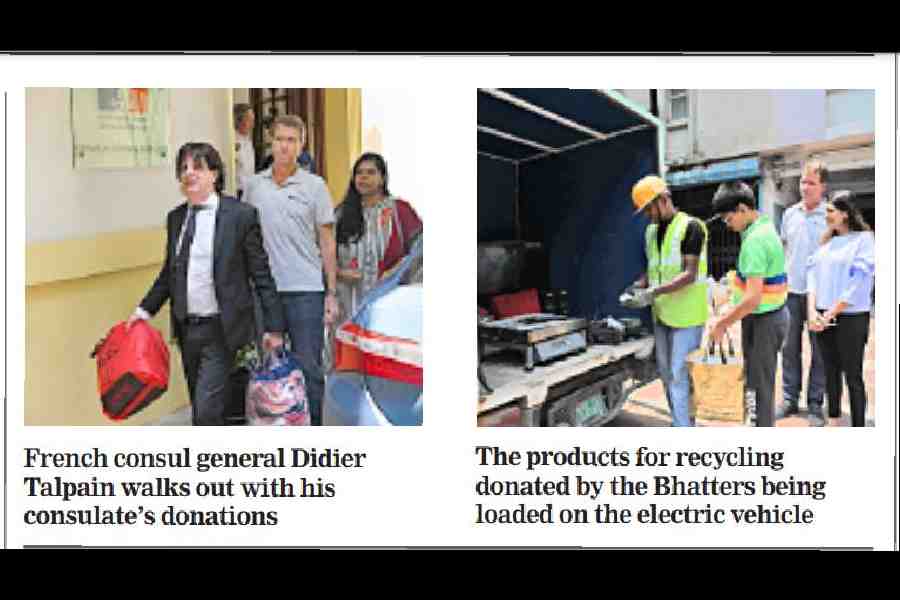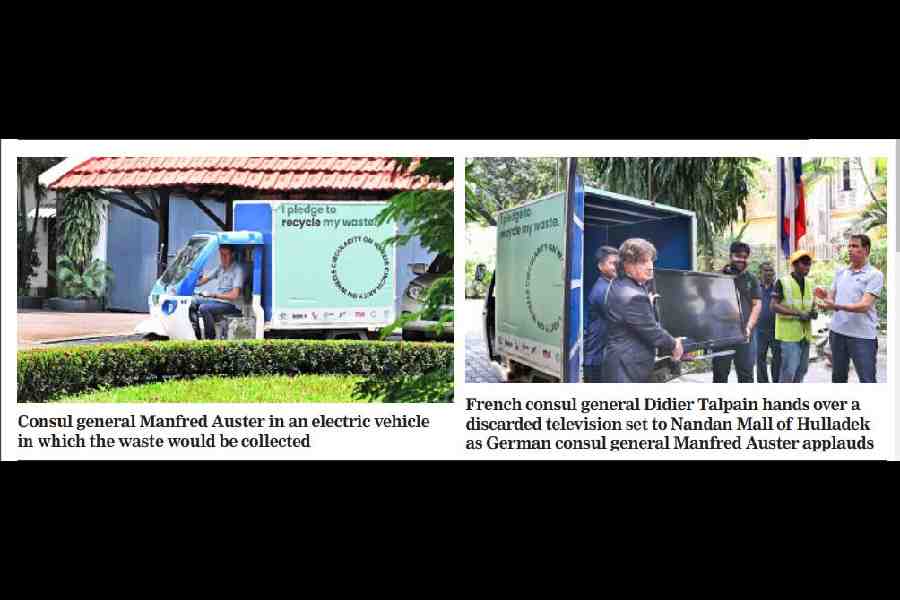It is not every day that residents of Alipore get to see their German neighbour, the consul general, drive out of his office in an autorickshaw.
But in the run-up to World Environment Day, Manfred Auster was on a mission. The consulate general was collaborating with Circularity on Wheels, an initiative taken by Hulladek Recycling, Earth Day Network and Twirl Store, to promote a circular economy where all items that are disposed of can be reused, repurposed, refurbished or recycled.
The auto was followed by an electric vehicle (EV) in which discarded electronic and clothes waste were to be collected by Auster himself, from houses that had volunteered to donate the same.
“We have started with e-waste and cloth waste for which we have partnered with Hulladek and Twirl. The alliance was launched in 2022 and the EV has been deployed this year,” said Ajay Mittal, director of Climate Change India and South Asia Earth Day Network, and founder of Circular Kolkata Alliance.
“When I am in the provinces, I travel in these autos a lot,” smiled Auster. “This one runs on (compressed) natural gas, which is better than oil. Electricity would be the next step.”
The first stop was the French consulate general where Didier Talpain, the consul general, was waiting with a damaged TV set, UPS, and some clothes. “For some people, it is natural to reuse and buy second-hand; for others, not at all. We consume a lot and generate a lot of waste. Small initiatives like this will create a cumulative impact. Worldwide, the second or third-hand market is giving a second or third life to a product. New legislations are coming in everywhere. In France, we are discussing a law that unsold clothes should not be destroyed but recycled,” said Talpain, as the donations were placed in the EV.
Auster responded by placing the initiative in perspective. “There are the big things that the governments are doing — signing the Paris Accords, listening to the IPCC (Intergovernmental Panel on Climate Change) and the scientists... We as individuals can make a difference too. Reuse things, upcycle them and if possible, recycle them. There are so many things you can put back into the economy with help from people who are dealing with that. That’s what today’s initiative is about,” he said.
The second stop was the apartment of the Bhatters in Alipore itself where 11-year-old Vikrant was donating things collected both from home and from friends, inspired by his mother Smita who has her brand of eco-friendly gifting products. The consul general put on an Indo-German friendship lapel pin on his T-shirt.
Nandan Mall, chairman and managing director of Hulladek, and Sujata Chatterjee, founder of Twirl Store, accompanied him on the drive. Mall explained how each kind of e-waste has to be separately dismantled. “The hazardous material in each product has to be recycled differently. This UPS, for instance, carries lead acid battery, the treatment of which is different from that of a lithium ion battery. Also the batteries are at risk of bursting if they are not stored in a cool environment. This is why e-waste should not be given to kabadiwalas as they lack the knowhow,” he explained.
Chatterjee pointed out how her store produces a range of eco-friendly products like bags, wall hangings etc created out of old clothes by rural women, who are trained by her company.
On his way out, Auster reflected: “We can set an example in so many ways. When we go to conferences, we can carry our own water bottle, putting away the PET bottle given to us. That would show the audience what we are talking about. My partner is running an upcycling company in Haiti that takes plastic trash from the streets and turns them into bags and other things of use. It can be done. That’s what we have to work for.”

